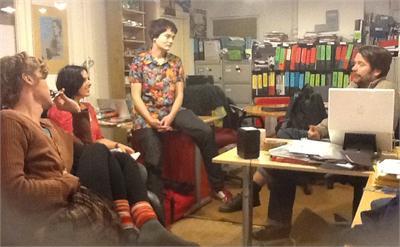“What’s it like at Platform?”
Since I started work here a few weeks ago this is the first question friends ask me when they see me. So far, I have failed to answer this question, offering a combination of mumbling, smiles and pregnant pauses. Where do you start?
I spent the last 10 years working for a big, international, campaigning organisation. I’m happy to say that despite the challenges and frustrations I loved it even up to the moment I left. I worked on campaigns to protect rainforests and marine life in places as diverse as Brazil and Africa. But I knew for a while that something was stirring inside me.
Outside of work, my academic background is in literature and film and from as long as I can remember I have been politically engaged and as long as I have been able politically active. I have always seen these areas as being interlinked. The arts was where my imagination and empathy were developed. I knew that they could ignite, transform and inspire where information and the standard tools of campaigning often do not. Alongside my campaigning day job, I have been involved in a wide variety of grassroots activism on environmental and social justice issues. Being a part of new models of participation such as consensus decision-making, organising with women and the creating and holding of autonomous spaces has developed my understanding of what social change can be.
It is rare that you can work in an interdisciplinary way to integrate these aspects and that’s why I was attracted to Platform. I have swapped an office of about 100 people for 11, the shouty skype coordination calls for communal office music, the big bucks and brand for a bit more freedom.
In my first weeks I have been finding out about the history of the organisation and the projects that are currently in train. From Shake, an education project with young people about race and power, combining art and activism to Desk Killer a work stream examining the conditions that enable individuals in corporations to enact atrocities and environmental destruction, the work at Platform is arresting and vital.
The rest of the Platform’s projects look at the complex web of ties and relationships- from the arts and governments to academic institutions and contractors – that carbon intensive industries such as big oil needs to keep the oil and money flowing. This year, the above mentioned Carbon Web project led to a book called the Oil Road: Journeys from the Caspian to the City of London and reports and briefings on piracy, the BP and Rosneft oil deal in Russia, and investor risk in Shell’s Arctic exploration. Platform has supported struggles for environmental justice in the wake of the Arab Spring, including the first anti-fracking campaign in North Africa and launched a three part sound work that acts as an alternate audio tour of Tate Britain, Tate Modern and the boat journey between the two.
My area is Nigeria, focussing on oil and human rights. It’s a complex topic that evokes difficult emotions and requires a long-term engagement and commitment. The current focus of the campaign is on ending UK oil related military aid to Nigeria, holding companies like Shell and UK mercenaries accountable for worsening contact in the Niger Delta and shifting UK government policy to corporate accountability and human rights. For now, I am trying to get a good understanding of the region. Soon I will be working out where next. Let us know if there is anything that we have done recently that you think is particularly inspiring or effective. We’d love to know. Just don’t ask me how Platform is going.
